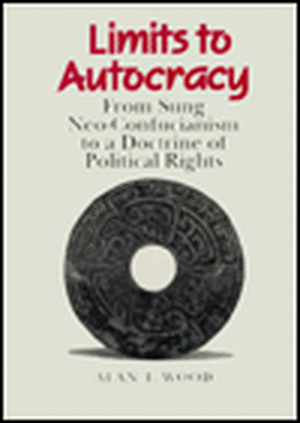Limits to Autocracy
Autor Alan T. Wooden Limba Engleză Hardback – 30 sep 1995
Alan T. Wood examines the cultural identity of modern China in the context of authoritarianism in the Chinese political tradition. Taking on issues of key importance in the understanding of Chinese history, Wood leads readers to a reconsideration of neo-Confucian thinkers of the Northern Sung dynasty. Modern scholars have accused Sung neo-Confucians of advocating a doctrine of unconditional obedience to the ruler--of revering the emperor and expelling the barbarian--and thereby inhibiting the rise of democracy in China. Wood refutes this dominant view by arguing that Sung neo-Confucians intended to limit the power of the emperor, not enhance it.
Sung political thinkers believed passionately in the existence of a moral cosmos governed by universal laws that transcended the ruler and could be invoked to set limits on his power. Wood makes a striking comparison of this view with a similar one of universal morality or natural law that developed in late Medieval Europe. By drawing attention to a much-neglected Confucian text, he contributes significantly to the wider dialog of human rights in China and brings forth fresh philosophical insights in his comparative view of Chinese and Western history.Preț: 196.69 lei
Preț vechi: 224.37 lei
-12% Nou
Puncte Express: 295
Preț estimativ în valută:
37.63€ • 39.30$ • 31.08£
37.63€ • 39.30$ • 31.08£
Carte indisponibilă temporar
Doresc să fiu notificat când acest titlu va fi disponibil:
Se trimite...
Preluare comenzi: 021 569.72.76
Specificații
ISBN-13: 9780824817039
ISBN-10: 0824817036
Pagini: 264
Dimensiuni: 150 x 217 x 22 mm
Greutate: 0.41 kg
Ediția:New.
Editura: University of Hawaii Press
ISBN-10: 0824817036
Pagini: 264
Dimensiuni: 150 x 217 x 22 mm
Greutate: 0.41 kg
Ediția:New.
Editura: University of Hawaii Press
Textul de pe ultima copertă
Many modern scholars of Chinese history, and many Chinese intellectuals throughout the twentieth century, have charged neo-Confucianism with laying the ideological foundations for the growth of autocracy in China. They have especially condemned neo-Confucian political thinkers of the Northern Sung dynasty (960-1127) who promoted a policy of "revering the emperor and expelling the barbarian" (tsun-wang jang-i), accusing them of having advocated a doctrine of unconditional obedience to the ruler and thereby inhibiting the rise of democracy in China. In Limits to Autocracy Alan T. Wood leads readers to a reconsideration of this prevalent view by arguing that Sung neo-Confucianists did not intend to enhance the power of the emperor but limit it. Sung political thinkers, who embedded their most important ideas in commentaries on the Confucian classic the Spring and Autumn Annals, believed passionately in the existence of a moral cosmos governed by universal laws accessible to human understanding. These laws, they believed, transcended the ruler and were not subject to his authority. By affirming the existence of a moral law higher than the ruler, this neo-Confucian doctrine could be used to set limits to his power rather than indulge it. Wood makes a striking comparison of this view with a similar doctrine of universal morality - natural law - that also provided a basis for limiting the power of the ruler and ultimately gave rise to a doctrine of human rights in Europe.
